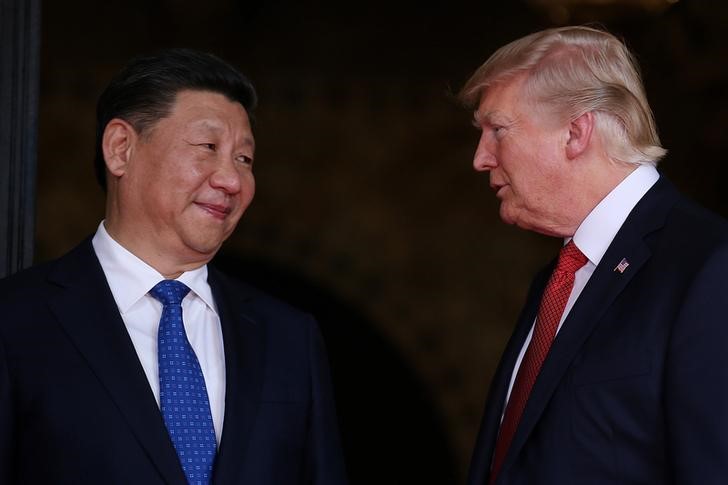ReElement Technologies stock soars after securing $1.4B government deal
Investing.com - Investors will be busy this week, juggling a much-hyped summit between the leaders of the U.S. and China as well as a bevy of earnings from mega-cap technology companies. Industrial economy bellwether Caterpillar is also due to report, while the Federal Reserve, Bank of Japan and European Central Bank are all set to unveil fresh interest rate decisions.
1. Trump-Xi meeting
One of the week’s most consequential events is set to take place on Thursday, when U.S. President Donald Trump and Chinese President Xi Jinping are due to meet in South Korea.
Markets are hoping that the summit between the leaders of the world’s two biggest economies will yield a deal on trade and other issues, defusing what has been rising tensions.
Over the weekend, negotiators from both sides said a framework of an agreement had been notched, with the final details being hammered out before being presented to Trump and Xi.
Trump recently threatened to slap triple-digit tariffs on China in response to Beijing’s expanded controls on exports of rare earth minerals, critical materials vital to production in industries ranging from semiconductors to electric vehicles.
U.S. Treasury Secretary Scott Bessent suggested that, following negotiations, the U.S. will ultimately not place the heightened tariffs on China, while Beijing is open to "concessions" on rare earth export restrictions.
2. Tech earnings flood ahead
Elsewhere, investors are facing up to a raft of corporate earnings, including a blockbuster 48-hour period during which five massive tech names that have underpinned much of the broader stock market are due to report.
This particular deluge is set to begin after the close of U.S. markets on Wednesday, when software titan Microsoft, Google-owner Alphabet, and Instagram-parent Meta Platforms are slated to unveil their latest quarterly results.
These will be followed by figures from iPhone-maker Apple and e-commerce giant Amazon after the closing bell on Thursday.
As has been the case for several quarters, markets will likely be paying close attention to the artificial intelligence spending plans put forward by these businesses. Although a flurry of recent dealmaking in the industry has driven some worries about a potential AI bubble, the arms race to harness and eventually monetize the groundbreaking technology has shown few signs of decelerating, and has even been credited with helping prop up the American growth during a time of widespread economic uncertainty.
3. Caterpillar to report
Aside from tech, construction equipment group Caterpillar’s results will be in focus before the opening bell on Wall Street on Wednesday.
The firm, considered to be a bellwether for the wider industrial economy, warned in August that it would encounter significant headwinds from U.S. tariffs during the second half of 2025.
In the third quarter, the costs from the duties are anticipated to stand at $400 million to $500 million. Over the course of the year, the levies were projected to cost Caterpillar up to $1.5 billion, reflecting the increased expenses tied to importing key components needed the company’s products.
Despite having eased off from his more sweeping trade measures earlier this year, the Trump administration has overseen an increase in the effective U.S. tariff rate to an estimated 18%, the highest level in just under a century.
4. Fed meeting
Meanwhile, investors will be busy assessing a Federal Reserve interest rate decision following the central bank’s latest two-day meeting beginning on Tuesday.
According to CME’s FedWatch Tool, the Fed is all but certain to slash rates by a quarter of a percentage point from a current target range of 4% to 4.25%. It would be a second straight reduction, following a similarly-sized drawdown in September.
Fed officials have appeared to prioritize bolstering a slowing labor market over signs of sticky inflation. Expectations that the Fed will continue to pursue this strategy seemed to be further solidified after official inflation data for September came in cooler than anticipated.
However, an ongoing federal government shutdown will mean that policymakers will be deprived of many fresh data sources typically used to calibrate monetary policy.
5. Bank of Japan, European Central Bank decisions
Outside of the U.S., a string of global central banks are scheduled to release their own interest rate decisions this week.
The Bank of Japan is tipped to debate whether the conditions are now correct to restart rate hikes amid an easing in concerns about a tariff-fueled recession.
But the ascension of Sanae Takaichi to become Japan’s new Prime Minister has led most analysts to predict that the BOJ will opt to leave borrowing costs unchanged. Takaichi has long advocated for more expansionist economic policies.
The European Central Bank is also anticipated to keep its deposit rate steady at 2% at its upcoming meeting on Thursday.
In a note to clients, analysts at UBS predicted that ECB policymakers will reiterate that monetary policy is "in a good place," while stressing that the central bank will make any future decisions based on economic data and won’t pre-commit to a particular rate path.
